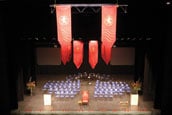Spatial awareness
It’s now more crucial than ever for venues to be commercially astute, and managing conferences and events is a critical part of this. Tony Smith offers some advice

At The Lowry in Salford, our catering and retail outlets are in-house, we’ve transformed our box office into an independent and profitable company, and our conference business goes from strength to strength. Earlier this year, when we celebrated our tenth anniversary, we increased our meeting room offer by undertaking the lease of a 6,000 square foot conference suite in an adjacent building.
In managing facilities, there needs to be a defined and mutually agreed system to avoid issues such as double bookings. Salford University hires the building for its graduations, clients hold receptions in our galleries, and artistic performances and rehearsals take place in our event rooms. Although The Lowry is fortunate to have dedicated conference rooms and rehearsal studios, space can still be at a premium. A relationship between artistic and commercial departments is crucial to operating and maximising the potential of any multi-use facility. We take a joined-up approach to recruitment: a conference co-ordinator cannot just have relevant career experience, they also need an understanding of our values.
When promoting conference facilities it is critical that you convey a professional image at all times – no matter how small your offer. Print, web, letters and even invoices need to convey the message that you take conferencing seriously, giving clients confidence that their event will be managed to a level that meets their expectations. You should explore all marketing opportunities. Five years ago The Lowry was nervous of working with competitor venues to jointly market our conference product. There is now a formal consortium of venues, which work together to promote our facilities. We jointly attend exhibitions, organise booking agent familiarisation weekends and even have a referral system for enquiries we cannot accommodate. The positive impact of this consortium has been substantial.
Your sales team must fully understand the unique selling points of your venue, and learn to match these to clients needs. We have a circular event room with floor to ceiling windows overlooking the waterfront and the Old Trafford Football Ground. However, if a client requires complete blackout for a presentation, the view is of little interest, so the focus should be on our in-house audio visual service. An increasingly important sales tool is our charitable status. Most organisations now have Corporate Social Responsibility targets, so holding events with a charity venue helps them to fulfill these objectives.
When dealing with enquiries it’s important to be realistic and honest. Whilst the priority is to secure business there is no point in over promising; this will only lead to disappointed clients who, at best, will never use you again, and, at worst, will demand a discount. The Lowry attracts a range of visitors and can be very busy. If a client requires a quiet environment, we may not be their best option.
Once you have secured a client, and delivered an event to their satisfaction, they are your easiest sales lead. It is easier to work with existing clients than constantly be looking for new ones. Clients should receive a feedback form, covering everything from pre-event co-ordination, to on the day management and catering. However, the most important question to ask is “will you use us again?” Whether their response is positive or negative, the client should be contacted either to secure on-going business or to establish how you could better fulfill their requirements in future.
The Lowry has been through a steep learning curve, and has evolved greatly over the years. We take a commercial and entrepreneurial outlook, but never to the detriment of our core artistic mission to ‘enrich, engage and entertain’.
Whilst the core purpose of The Lowry, should always be our focus, it’s vital that the significant contribution of our conference and event business is recognised across the organisation. We have worked hard on this over recent years. It is now commonplace for commercial activity to be featured in staff briefings, which are primarily for information about artistic programming. We take every opportunity to remind our teams that artistic and commercial departments could not exist without each other.
Whilst not all venues may be of the scale of The Lowry, most could utilise some of their space to accommodate conferences and events. If you don’t currently do so, there has never been a better time to at least consider your options.
Join the Discussion
You must be logged in to post a comment.